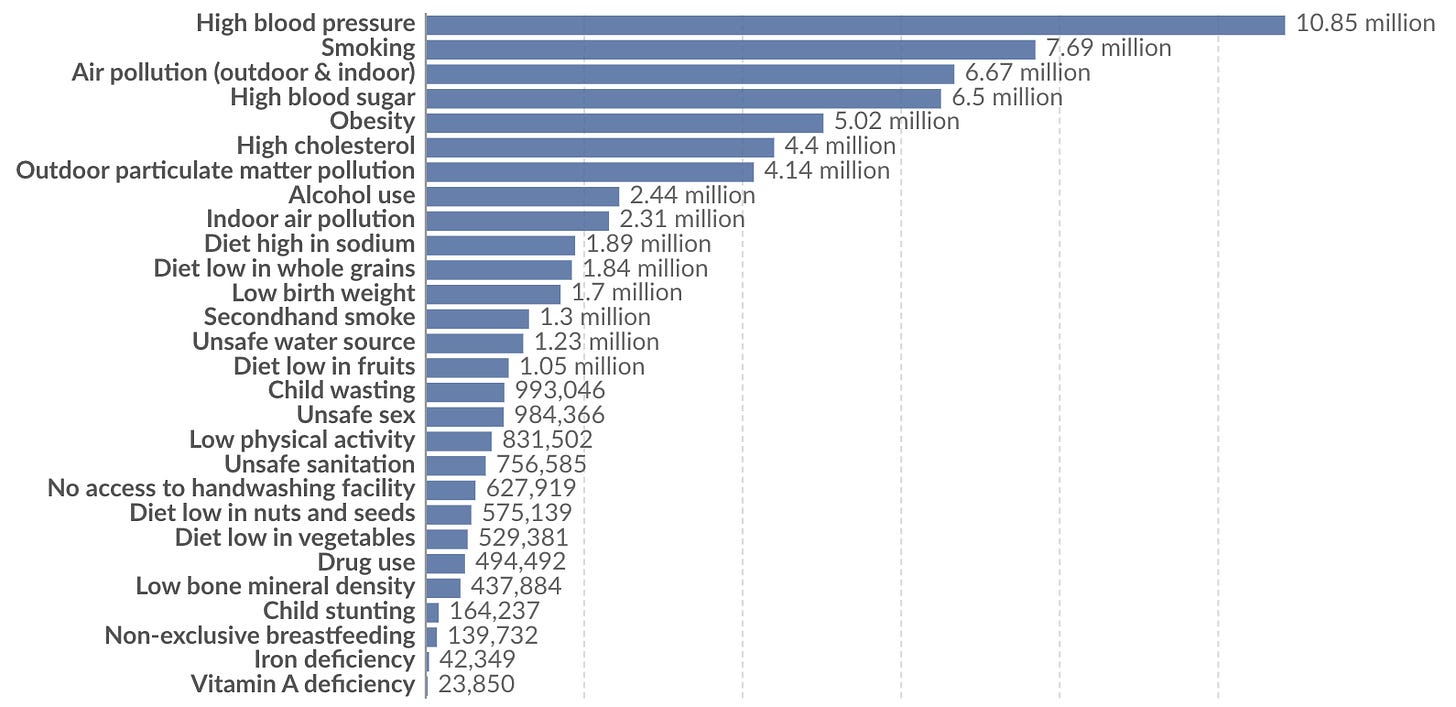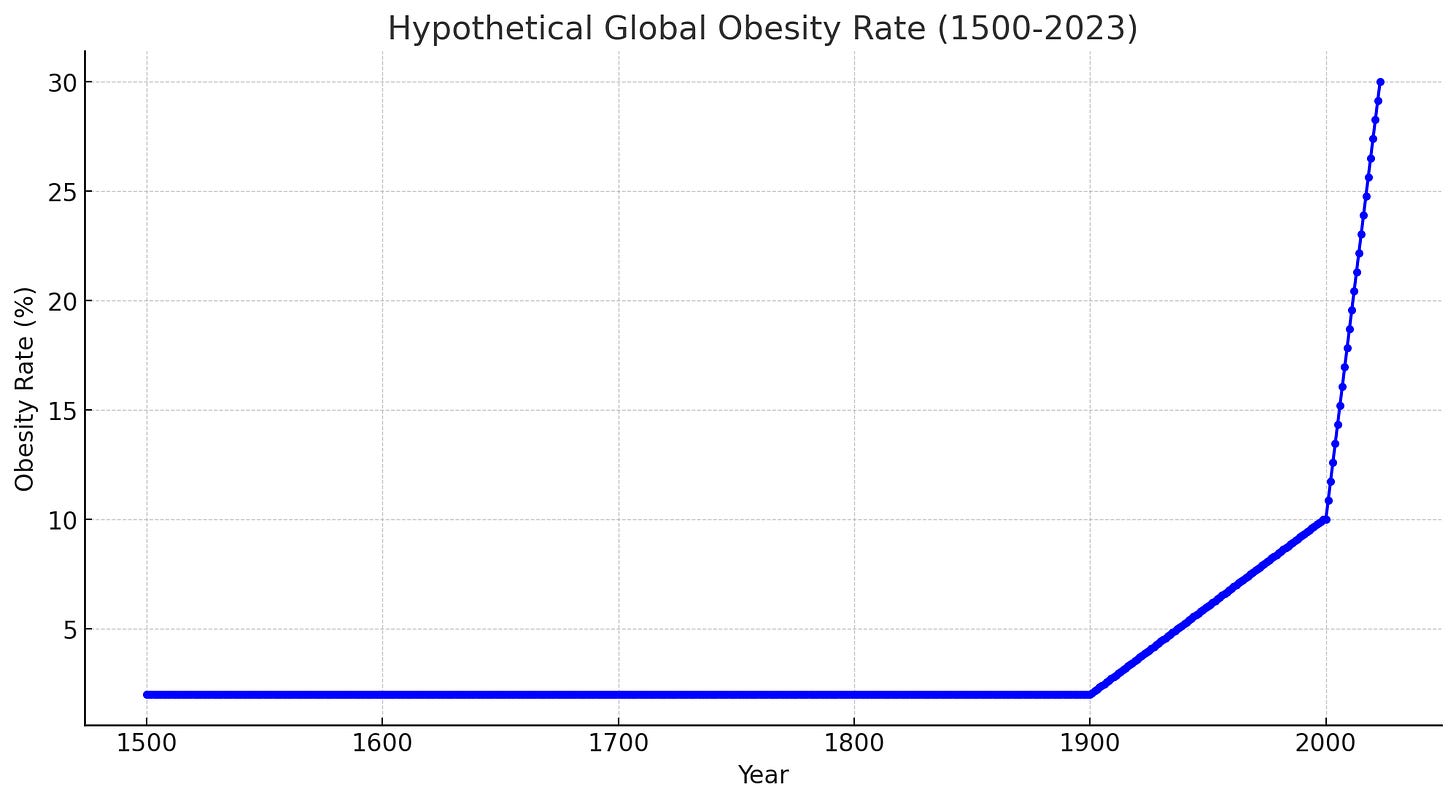In August I tweeted, “weight loss will solve 50% of your problems” and upon further reflection, I stand by my tweet. Okay, now hold on a second—let met caveat this entire post so that you don’t think I’m a monster with malicious intent.
I am not here to shame
I am not here to blame
I am here to help
Now that you know my intentions, we can proceed.
I realize this is a provocative tweet and title for a blog post title but I know I’m not alone in a vacuum. My friend Kevin (founder of Epic Gardening) reacted to my tweet, and he has publicly shared his struggles with his weight for some time. This year he’s made concerted efforts and lifestyle changes that have contributed to his overall physical and mental health, and losing lots of weight.
For the last 15 or some odd years I’ve been experimenting with my health and more recently I've written about it, like this post OMAD (one meal a day), a blog post on fasting, and another on breathing—ultimately with the goal of helping people live happier and healthier lives.
I genuinely believe that for most people (not all of course), losing weight will solve basically 50% of your problems because there are downstream issues that you’re unaware of when you carry around too much weight. I’ll explain: losing weight won't solve all of your problems but it will solve all of your weight problems, and the problems directly related to your health, physical ailments, your psychological and mental issues, social, and personal. Let’s look at some of the benefits (all of which have been proven and backed by science):
Physical benefits
Cardiovascular health: Weight loss can reduce the risk of heart diseases, stroke, and high blood pressure. Shedding even a small amount of weight can improve cholesterol levels.
Joint health: Weight loss can reduce stress on joints, decreasing the risk of osteoarthritis.
Reduced risk of diabetes: Weight loss can increase insulin sensitivity, reducing the risk of type 2 diabetes.
Improved respiratory function: Reduced weight can decrease the likelihood of sleep apnea and may alleviate asthma symptoms.
Better digestive health: Weight loss can decrease the risk of gastrointestinal conditions like GERD.
Decreased cancer risk: Obesity is a risk factor for several types of cancer. Losing weight might reduce this risk.
Improved immune function: Obesity is linked to impaired immune response; weight loss can bolster the immune system.
Extended life span: Many studies show that weight loss can increase longevity.
Improved reproductive health: Weight loss can lead to more regular menstrual cycles and increased chances of conception in women. In men, it can improve erectile function.
Reduced inflammation: Overweight and obesity often lead to chronic inflammation, which can be alleviated by losing weight.
Mobility: Shedding pounds can make it easier to move, increasing overall physical activity levels.
Lowered pain levels: Weight loss can alleviate pain conditions, including chronic back pain.
Mental and psychological benefits
Boosted self-esteem: Achieving weight loss goals can increase feelings of self-worth and confidence.
Reduced symptoms of depression: Some people experience a decrease in symptoms of depression after losing weight.
Better sleep: Weight loss, especially when combined with regular exercise, can improve sleep quality and duration.
Increased cognitive function: Some studies suggest weight loss can improve memory and attention.
Reduced anxiety: Weight loss and improved body image can lead to decreased anxiety levels in some individuals.
Enhanced emotional regulation: Stable blood sugar levels from a healthier diet can aid emotional stability.
Stress relief: Engaging in healthy habits to lose weight, like exercise, can be a natural stress reliever.
Improved body image: Achieving a healthier weight often results in a more positive perception of one's own body.
Sense of accomplishment: Meeting weight loss goals can provide a profound sense of achievement and purpose.
Social benefits
Improved social interactions: With increased self-esteem and confidence, social interactions might become more frequent and fulfilling.
Increased participation in activities: With a healthier body and mind, one might feel more inclined to participate in social or recreational activities.
Positive role modeling: Individuals who lose weight healthily can inspire others to adopt a healthier lifestyle.
Strengthened relationships: Taking on weight loss as a shared journey can strengthen bonds between friends or family members.
Now, talking about weight and weight loss has become so politicized and taboo that it seems like we’ve been unable to make any progress. In our current climate, people can easily fall into dangerous doom loop where they’re being told that it’s okay, and even healthy, to be overweight. People get so charged on this topic I think it’s mostly because they aren’t addressing a deeper issue rooted somewhere within themselves. But this issue is too important and it needs addressing.
Given the devastating effects that being overweight has on the body, we have to stop pretending that it doesn’t have negative effects. We must acknowledge that people are struggling, seek to help them, and encourage healthier ways for living for all. I will mention the obvious: of course being overweight doesn’t make you a bad person (and fortunately carrying around too much extra weight is not a permanent state).
I, too, am nowhere near perfect as I’ve had weight issues like most anyone reading this. The COVID-19-lbs really got me and I’ve had work to lose that weight, which I was able to do. So just know, I’m not on some high horse coming from a sanctimonious place preaching to thee. Rather, I’m making a point that will hopefully help save people some misery and headache from problems that could ultimately be avoided.
Don’t be an asshole. Yes, we shouldn’t demonize people on their weight loss journey. There are people at different stages. Seeing someone at the beginning of their journey getting after it at the gym personally makes me fired up, and we should praise them for wanting to make a change. Encouragement, understanding, and compassion are the foundations for helping others. And honestly I’m just calling a spade a spade—people are doing others and themselves a moral disservice out of fear of being “intolerant.”
60% of Americans are clinically obese
The USA is Fat, Sick, and Nearly Dead. A lot of this isn't our fault as we've been lied to about what’s healthy and what isn't (e.g. The Food Pyramid)—and not to mentioned the fact that unhealthy food has been made abundantly cheap and readily available. It doesn’t get any easier that many of us now work from home—the refrigerator and pantry are always a short walk away. We're also not moving as much as our ancestors, making it so much easier to accumulate extra weight.
You really notice the shocking differences between the US and the rest of the world when you travel abroad. I just got back from a trip to Prague and Budapest where everyone is not-trying-too-hard thin. Sure, they have McDonalds and all of the comforts that Americans do, but we don’t we see the same rates of obesity there.
Let’s look at some data. The following graph is shows death statistics for the global population, and as you can see, weight-related deaths are at the top.
When you look at human history, being overweight was not prevalent until very recently as life got much easier. Here’s a helpful framework:
Pre-20th Century: For much of human history, being overweight was often seen as a sign of wealth and prosperity, especially in times and places where food was scarce. However, widespread obesity as a public health issue was not common.
20th Century: The latter half of the 20th century saw a sharp rise in obesity rates in many parts of the world, particularly in developed nations. This can be attributed to various factors including changes in diet, sedentary lifestyles, and increased access to calorie-dense foods.
21st Century: Obesity has become a global epidemic, with rising rates in almost all countries. The WHO has provided data indicating that the prevalence of obesity has nearly tripled since 1975.
Here’s a graph that illustrates the obesity rate from 1500 to now:
You can observe that there's a distinct spike in the 21st century, representing the global epidemic of obesity we are currently experiencing. The “it’s just genetic” excuse is one of the biggest lies we’ve ever been told. Being overweight isn’t genetic—it’s directly correlated with the amount of stored energy you have on your body compared to the amount of energy you’ve burned. It isn’t genetics, it’s physics.
Tips and resources for weight loss
So what can we do? Understanding where we went wrong is helpful but it only goes so far. I have some personal tips about where to start and some learnings that have worked for me. But there is no silver bullet. It takes time and effort to discover what works for you so be patient and ruthless.
Systems
We can set up systems to help us lose weight and keep it off so we can live a healthier and happier life.
Fasting: For me, this has been the easiest way to lose weight and keep it off.
Make it hard to gain weight by having more healthy food and less unhealthy snacks and dessert.
Stay moving: by aiming for 10,000 steps a day, do physical exercise at the gym, anyhing—just stay moving.
Constantly experiment.
Goals
Set goals but realize you will fail from time to time.
Don’t go over a certain weight and/or number of calories per day.
Tracking
Track progress by weighing yourself on a regular basis.
Keep a journal or log.
Use apps to help track progress like Zero which is useful for fasting.
Resources
Read anything and everything from people like Peter Attia, MD, Chris Kresser, and Dr. Rhonda Patrick—they have some incredible science-based resources on not only losing weight but on living a healthy, active life.
Accountability
If you feel comfortable share your learnings in public with with a group who can help hold you accountable.
Get help from a spouse, friend, or community who can help you achieve your goals with positive support.
This journey isn’t always easy. It’s important to not beat yourself up, causing you to further perpetuate your inability to keep the pounds off. It’s going to be okay, and it’s important to look at the big picture. Optimize for the long run, not the short tun.
Feel free to leave a comment or send me an email. I want to be helpful, and I’m well aware that pointing these things out can be awkward. I hope that at the very least this post has either inspired and/or helped educate you to take control of your weight. Losing weight won’t solve all of your problems, but it will solve many of them. Godspeed.






